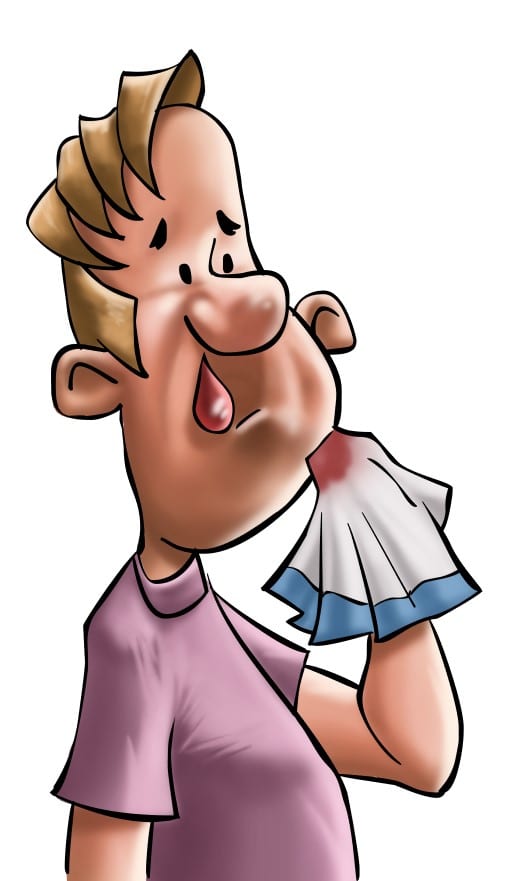
Can snoring cause nose bleeds? – Here’s what we know
By Jason Wooden, PhD | January 25, 2020
While the link between snoring and nose bleeds has not been directly studied, snoring is not one of the known causes of nose bleeds. Dry air, injury from nose picking, infection, and allergies are among the more common causes.
If you’re worried snoring may be making things worse, there’s plenty you can do – nasal obstruction remedies, devices to keep the tongue from blocking the airway, and chin straps to stop mouth breathing. You should also see a doctor as there may be something more serious going on.
In this article, we’ll talk about:
Waking up in the middle of the night with a bloody nose can be pretty alarming, so it’s understandable if you’re wondering if snoring can cause nose bleeds.
Ditto if you’re waking up in the morning with blood all over your pillowcase, face, and hands.
Nosebleeds can be a nuisance coming on suddenly with no warning. There also quite common – about 60% of people will experience a nose bleed at some point in their life.
And if it’s happening mostly at night, I can see why you might suspect it’s your snoring.
Your nose and mouth are both on your head, right?
Maybe not so fast…there may be more going on beneath the surface.
Let’s take a quick look at what we know and what else you might want to think about.
.

Can snoring really cause nose bleeds?
Your nose is loaded with blood vessels to help warm and humidify the air you breathe. Because these vessels lie so close to the surface, they’re easy to injure.
The most common cause of bleeding from these blood vessels, known medically as epistaxis, is minor irritations or colds. Air moving through the nose can dry and irritate the inner lining of the nose.
So, can snoring also cause nose bleeds?
The short answer is most likely no.
While the relationship between snoring and epistaxis has not been directly studied, it’s not one of known causes of nose bleeds.
So, even if you’re getting nose bleeds on the nights you snore, it’s likely that other things may be responsible.
One of the most common reasons people get nosebleeds at night is dry air. If there’s not enough moisture in the air, the nose lining can dry out and become more prone to bleeding.
They’re also other things to think about…
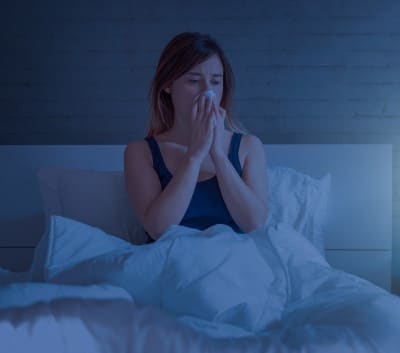
What else besides snoring could be causing my nose bleeds?
Currently, there’s little direct evidence that snoring can cause nosebleeds. However, there are other things that could be involved:
I’ve already mentioned dry air, but what else could it be?
There’s a long list of causes and risk factors linked to nose bleeds:
- Nose picking
- Infections
- Allergies
- Antihistamines / decongestants over use
- Nasal sprays over use
- Frequent nose blowing and sneezing
- Foreign objects in the nose
- Injury to the nose
- High doses of aspirin
- Deviated septum
- Chemical irritants, such as ammonia
- Alcohol abuse
- Blood thinners
- High blood pressure
- Blood clotting disorders
- Hormonal changes
- Cocaine use
As you can see, there are plenty of things that can damage or irritate the lining of the nose. It’s a good idea to work with a doctor to figure out the culprit and the best remedy for you.
Meanwhile, here are a few night time remedies you can try:
Get a humidifier:
Do you live in a dry climate or more frequently get nose bleeds in the winter when you run your home heater? Your nose can become irritated, crack, and bleed when the lining dries out. Try running a humidifier at night to moisten the air.
Avoid picking:
Picking your nose while you sleep can damage the lining, especially if your nails are sharp. Try to keep some tissues nearby.
Saline sprays:
Using a saline spray before bed can help keep your nose moist. They can also help clear up congestion without drying out your nose.
Avoid alcohol and smoking:
Alcohol can make your nose more prone to bleeding. Cigarette smoke can irritate and damage the inside of the nose.
Again, it’s good idea to talk with your doctor as there may be something more serious going on.
When should you get medical attention for a nose bleed?
The National Institutes of Health recommend you seek help if:
- Nose bleeds lasts for longer than 20 minutes
- Nose bleeds occurs after a head injury
- You suspect your nose may be broken
- You have frequent nose bleeds
- Nose bleeds are not associated with a cold or other minor irritation
- Nose bleeds happen after sinus or other surgery
Source: U.S. National Library of Medicine
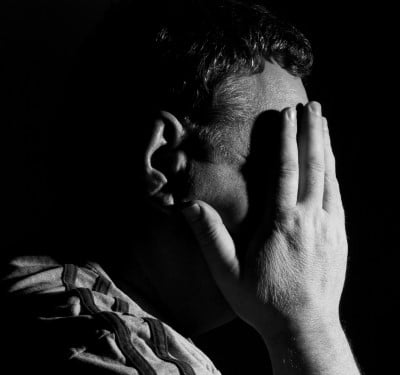
What else besides snoring could be causing my nose bleeds?
Even though snoring is not one of the known causes for nose bleeds, you may still be worried it’s making things worse.
Well, it turns out there’s plenty you can do.
And another reason to do something about your snoring is that it’s a big time sleep wrecker. It can keep you from getting deep restful sleep and make for miserable nights for a roommate.
Habitual snoring can also be a side effect of obstructive sleep apnea, a sleep disorder which interrupts your breathing during the night and pulls you out of restorative deep sleep into light sleep. The result is that you wake up feeling as if you’ve never slept.
This is pretty serious – obstructive sleep apnea has been linked to high blood pressure, heart disease, stroke, diabetes, depression, and various other health issues.
So, there’s plenty of reason to deal with your snoring.
Snoring happens when air flowing through your mouth and nose is obstructed, causing the tissues in your throat to vibrate.
There’s a wide variety of remedies depending on the exact cause:
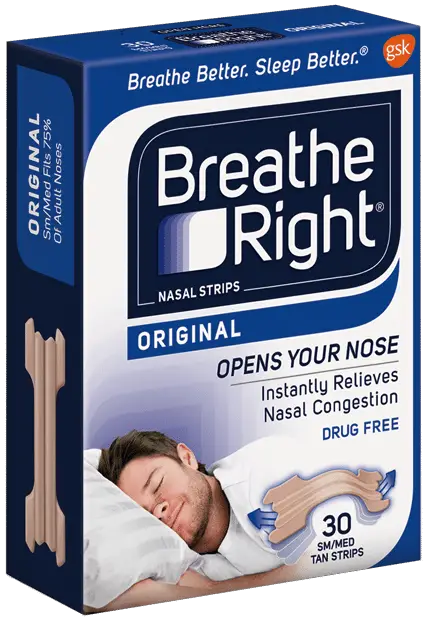
A) Nasal obstruction
A cold or allergy can give you a stuffy nose, block airflow, and cause snoring.
Depending of your situation, your doctor may recommend:
- a hot shower before bed
- saline nasal sprays
- over-the-counter decongestants
- over-the-counter steroid nasal sprays
- nasal strips such as Breathe Right to open nasal passages
- nose vents to open nasal passages such as SnoreCare or Gideon
- for allergies, changes to your diet or environment
Be sure to discuss with your doctor the pros and cons of specific treatments.
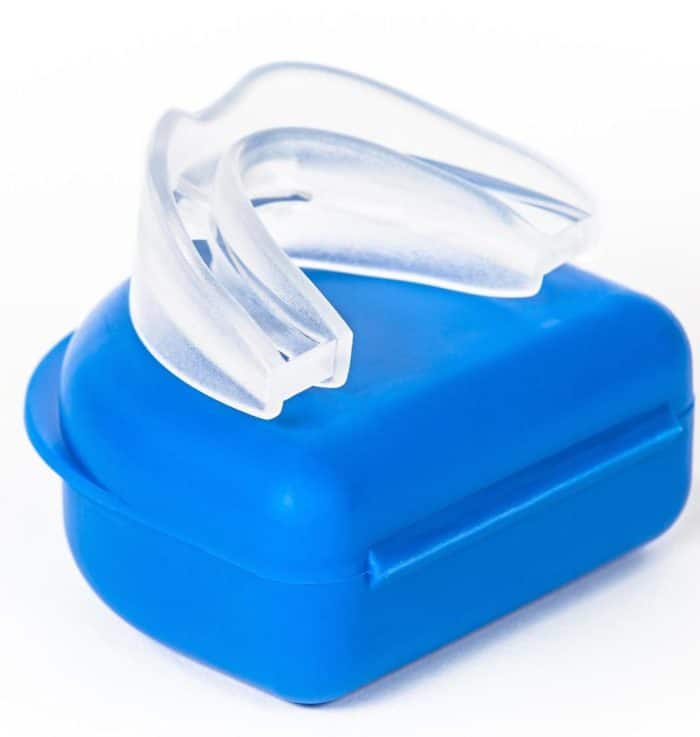
B) Relaxed Tongue
A common cause of snoring is when the tongue relaxes, fall backwards, and blocks the airway. This is what often happens for people with obstructive sleep apnea.
Oral appliances can be used to reposition the lower jaw and tongue so that the airway stays more open. CPAP (continuous positive airway pressure) is another sleep apnea treatment that has been known to help with snoring.
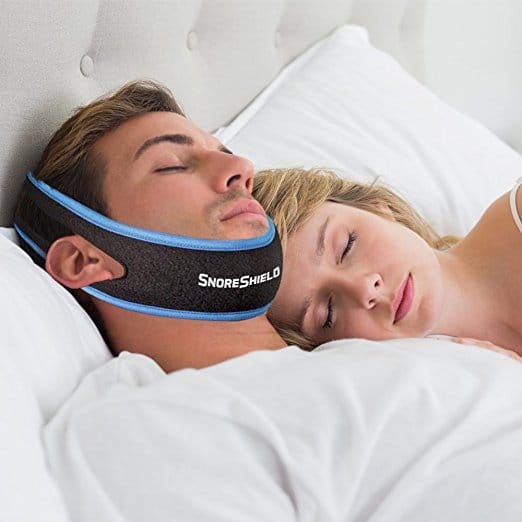
C) Open Mouth
Mouth breathing while you sleep can also cause snoring. Chin straps are a low cost remedy that works for some people. (Others may find the strap too uncomfortable or have trouble keeping it in place during the night.)
Get help from a sleep specialist
Snoring can wreck your sleep and the sleep of anyone nearby. It can also be a sign of obstructive sleep apnea.
What to remember about snoring and nose bleeds:
- There are many other things beside snoring that could be causing your nose bleeds
- If you’re worried snoring is involved, there’s plenty you can do
- Be sure to check with a doctor as there could be something more serious going on
Sources:
1. Recent Trends in Epistaxis Management in the United States 2008-2010, JAMA Otolaryngol Head Neck Surg. 2013; 139(12):1279-1284.
2. “Nosebleed”, NIH website
3. Epistaxis (Nose Bleed), Ayesha Tabassom; Julia J. Cho., Treasure Island (FL): StatPearls Publishing; 2020
4. “What causes a nosebleed at night?”, MedicalNewsToday website
5. “What Causes Nosebleeds and How to Treat Them”, Healthline.com
6. “Nosebleeds”, Mayo Clinic website
7. “Nosebleeds”, American Academy of Otolaryngology–Head and Neck Surgery Foundation website
Connect with us:
About Us
Better Sleep Simplified® was founded as a place for you to get clear and well-researched information.
Our goal is to make sure you know about your options so that you take action sooner rather than later.
Check us out on YouTube:
Watch and Learn
Helpful sleep tips, interesting sleep facts and statistics you want to know about
Affiliate Disclosure
This site is a participant in the Amazon Services LLC Associates Program and other affiliate advertising programs designed to provide a means for sites to earn advertising fees by advertising and linking to them.
Important: BetterSleepSimplified.com is for informational purposes only and is not intended or implied to be a substitute for professional medical advice, diagnosis, or treatment. Always consult a physician for sleep and health concerns. See additional information.
